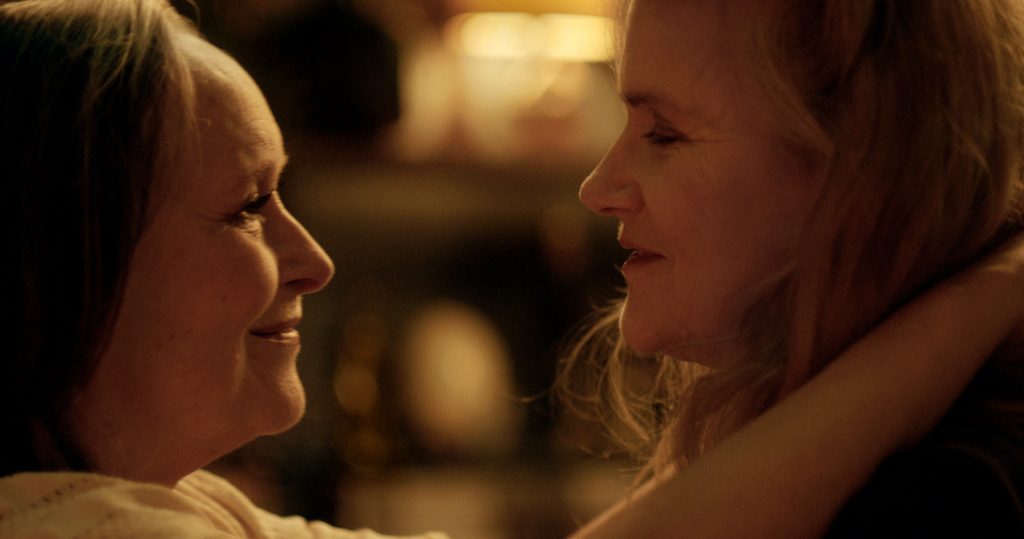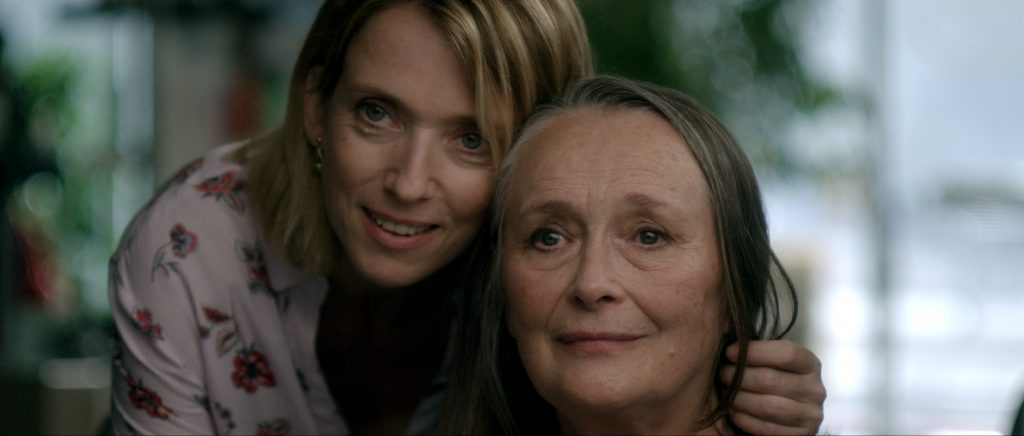January 29, 2023
by Carla Hay

Directed by Lukas Dhont
Dutch, French and Flemish with subtitles
Culture Representation: Taking place in an unnamed city in Belgium, the dramatic film “Close” features a predominantly white cast of characters (with a few black people) representing the working-class and middle-class.
Culture Clash: Two 13-year-old boys, who are best friends, become the targets of gossip that the boys are gay, they get bullied for it, and then tragedy strikes.
Culture Audience: “Close” will appeal primarily to people who are interested in watching emotionally authentic dramas about how bullying and repressed feelings can affect young people.

“Close” is a memorable coming-of-age film that effectively shows the intersections of identity self-esteem, homophobia and mental illness from an adolescent viewpoint. If you’re looking for a Hollywood-made version of these issues, then you won’t find it in “Close.” And that’s not because the movie takes place in Belgium. “Close” has a more thoughtful, realistic and subtle approach that is the opposite of Hollywood-made movies that tend to have obvious messaging in overly contrived melodrama.
Directed by Lukas Dhont (who co-wrote the “Close” screenplay with Angelo Tijssens, “Close” had its world premiere at the 2022 Cannes Film Festival, where the movie won the Grand Jury Prize. “Close” also received an Academy Award nomination for Best International Feature Film. It’s not a movie about trying to guess if the close friendship between two 13-year-old boys is about homosexuality. Rather, the movie explores themes of coping with grief, staying true to one’s self, and a heart-wrenching reality that love sometimes isn’t enough to prevent a tragedy.
“Close” takes place in an unnamed city in Belgium, where 13-year-old best friends/schoolmates Léo (played by Eden Dambrine) and Rémi (played by Gustav De Waele) are so close, when they have sleepovers, they cuddle next to each other in the same bed. This imagery in the movie is meant to get viewers to question and evaluate what they think is “appropriate” for kids of this age, in terms of masculinity and femininity. When 13-year-old girls act this way, it’s not automatically assumed that they are homosexual. But 13-year-old boys who act this way are usually perceived as being homosexual or being curious about homosexuality, if they express close and affectionate emotional intimacy with each other.
From the start of the movie, Léo shows that he’s the more confident and more extroverted of the two pals. Rémi plays the oboe as a hobby. Léo tells Rémi when they are in Rémi’s bedroom: “I have an idea. I’ll become your manager. And we’ll travel the world, even the moon. And we’ll become filthy rich.”
Léo also offers to upload a video on YouTube of Rémi playing the oboe. “It will get a million views,” Léo says enthusiastically of this proposed video. However, Rémi declines this offer. He wants to play the oboe for the pure enjoyment of it, not to get rich and famous
While they are in bed together, Léo tells Rémi a story in which Rémi must imagine himself as a newborn duckling who is more beautiful than the others. “You encounter a rhyming lizard, and you like it. You both leave and end up jumping on a trampoline. You jump as high as the stars.” And then, Léo blows air from his mouth on Rémi, to simulate the wind outside.
Throughout the movie, scenes with Léo and Rémi leave it open to interpretation if there’s something homoerotic brewing between these two teens, or if they really are just platonic friends. Other students at their school notice the ambiguity. Some of the students assume that Léo and Rémi are “dating” each other. One girl comes right out and asks Léo and Rémi if they are more than friends because she says Léo and Rémi act like they are couple.
Léo responds by saying that he and Rémi are best friends and are like brothers. However, Léo has more delicate-looking physical features, so he gets bullied more often than Rémi does for being “girlish” or “effeminate.” Some of the boys at school call Léo a “girl” and a derogatory term used for gay males that starts with the letter “f.”
If there is something “gay” going on between Léo and Rémi, then Léo is the one who’s more likely to show it physically, through affection or aggression. A scene in the movie shows Léo and Rémi playfully rough housing in bed. At the breakfast table the next morning, Rémi is tearful and says his stomach hurts. What really bothers him—but what he won’t tell his family—is that Léo got a little too rough in their playfighting the night before. As a result, Rémi acts aloof with Léo and seems to want to distance himself from Léo.
And what do the families of Léo and Rémi think of the relationship between these two teens? Léo lives with his mother Nathalie (played by Léa Drucker), his father Yves (played by Marc Weiss) and his older brother Charlie (played by Igor van Dessel), who’s about 16 years old. The parents are cotton farmers who expect Léo and Charlie to help out pick cotton in the field when they can. These family members of Léo are preoccupied with their own lives and don’t seem to have an opinion either way about the close relationship of Léo and Rémi.
Léo spends a lot of time at Rémi’s house and is very fond of Rémi’s mother Sophie (played by Émilie Dequenne), who is mutually admiring of Léo. An early scene in the movie shows Léo, Rémi and Sophie lounging together on some grass outside. Sophie tells Léo in a teasing voice that he’s more devoted to her than to Rémi. As for Rémi’s father Peter (played by Kevin Janssens), he doesn’t disapprove of Léo and Rémi’s relationship, but Peter is more of an observer who doesn’t get as personally involved as Sophie does.
At school, Léo is on the ice hockey team, where he gets increasing hostility from boys who think that Léo is gay. Rémi observes some of this bullying, but he does nothing to stop it. The hockey coach and any of the school’s faculty and staff don’t do anything either about this verbal abuse. Léo is often outnumbered when he’s being bullied, so he doesn’t think there’s much he can do to stand up for himself.
Meanwhile, Léo reacts to Rémi’s aloofness by spending more time with other kids in the school who are very tolerant of who Léo is. One day, Rémi has what can best be described as an emotional meltdown when he sees that Léo left hocky practice early and didn’t wait for Rémi so they could do their usual hangouts after hockey practice. Rémi starts a physical brawl with Léo in the school yard. The fight is so bad that some adults at the school have to intervene and put a stop to it.
It’s easy to see that even though Rémi initially put some distance between himself and Léo, it really bothered Rémi that Léo was going on with his life and spending time with other kids. What could prompt this possessiveness from Rémi? Many people could interpret it as Rémi being secretly in love with Léo and having a hard time coming to terms with it. However, “Close” never shows any explicit homosexuality between Léo and Rémi. Therefore, much of what the movie shows of Léo and Rémi’s relationship is left up to interpretation and speculation.
The relationship between Rémi that Léo is forever changed when an unexpected tragedy happens. It’s enough to say that one of the boys finds out that within this close relationship, he might not have known his best friend as well as he thought he did. How he copes with this harsh reality is one of the main plot developments in the second half of the movie.
In the production notes for “Close,” director/co-writer Dhont says that one of his biggest sources of inspiration for this partially autobiographical movie was Dr. Niobe Way’s 2011 non-fiction book “Deep Secrets: Boys’ Friendships and the Crisis of Connection.” The book expounds on how society’s definitions of masculinity and feminity affect friendships between boys. When boys reach puberty age, they’re expected to show their emotions less, as “proof” that they’re becoming men. That repression of emotions can often extend to friendships between boys too.
After all, when two 13-year-old male best friends say “I love you” to each other, people will often interpret it as “effeminate homosexual,” whereas if two 13-year-old female best friends say “I love you” to each other, they don’t get the same type of judgment. There is underlying homophobia and sexism in these gender expectations. “Close” invites viewers to contemplate and to be mindful of how this bigotry can affect emotionally fragile people.
All of the cast members of “Close” are admirable in their roles, but viewers will remember Dambrine’s performance the most. He makes an impressive feature-film debut as a 13-year-old boy who learns some adult life lessons in ways that his character Léo did not expect. The movie ultimately shows, in heartbreaking ways, the damage that can be done when people can’t or won’t express their true emotions to the people who matter the most to them.
A24 released “Close” in select U.S. cinemas for a one-week limited engagement in select U.S. cinemas on December 2, 2022. The movie was re-released in U.S. cinemas on January 27, 2023. “Close” was released in Belgium on November 9, 2022.


